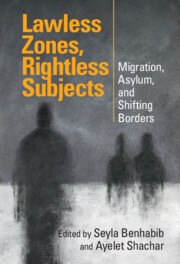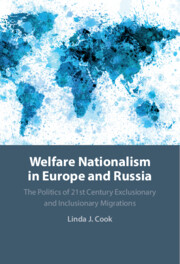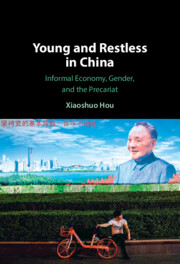Refine search
Actions for selected content:
73 results
Chapter 20 - Nairobi as an Archive of Literary Imagination
- from Part III - Maps
-
-
- Book:
- African Literature in Transition
- Published online:
- 31 October 2025
- Print publication:
- 13 November 2025, pp 311-323
-
- Chapter
- Export citation
10 - Social Transformations during Infancy
- from Part III - Lifespan Development in Diverse Sociocultural Contexts
-
-
- Book:
- The Cambridge Handbook of Psychological Anthropology
- Published online:
- 22 October 2025
- Print publication:
- 25 September 2025, pp 253-274
-
- Chapter
- Export citation
14 - Aging and Senescence
- from Part III - Lifespan Development in Diverse Sociocultural Contexts
-
-
- Book:
- The Cambridge Handbook of Psychological Anthropology
- Published online:
- 22 October 2025
- Print publication:
- 25 September 2025, pp 349-366
-
- Chapter
- Export citation
6 - Revaluation
- from Part III - Unsettling Environments: Threat, Loss, and Precarity in Russia’s Peatlands
-
- Book:
- Burning Swamps
- Published online:
- 06 September 2025
- Print publication:
- 25 September 2025, pp 198-230
-
- Chapter
- Export citation
Conclusions
-
- Book:
- Burning Swamps
- Published online:
- 06 September 2025
- Print publication:
- 25 September 2025, pp 231-236
-
- Chapter
- Export citation
Japanese Freelance Workers Struggle during the COVID-19 Pandemic: Social Media, Critique, and Political Resistance
-
- Journal:
- Asia-Pacific Journal / Volume 18 / Issue 18 / September 2020
- Published online by Cambridge University Press:
- 14 March 2025, e3
-
- Article
-
- You have access
- Open access
- Export citation
The Legacy of Temporary Employment in Francoist Spain
-
- Journal:
- Social Science History / Volume 49 / Issue 1 / Spring 2025
- Published online by Cambridge University Press:
- 10 April 2025, pp. 139-172
- Print publication:
- Spring 2025
-
- Article
-
- You have access
- Open access
- HTML
- Export citation
2 - Cease-Fires
- from Part I - Territoriality and Rights Protection
-
-
- Book:
- Lawless Zones, Rightless Subjects
- Published online:
- 02 January 2025
- Print publication:
- 09 January 2025, pp 43-58
-
- Chapter
-
- You have access
- Open access
- HTML
- Export citation

Lawless Zones, Rightless Subjects
- Migration, Asylum, and Shifting Borders
-
- Published online:
- 02 January 2025
- Print publication:
- 09 January 2025
-
- Book
-
- You have access
- Open access
- Export citation
1 - Introduction
-
- Book:
- Young and Restless in China
- Published online:
- 02 November 2024
- Print publication:
- 05 December 2024, pp 1-21
-
- Chapter
- Export citation
Chapter 1 - Precarious Riches
-
- Book:
- Insurgent Cultures
- Published online:
- 07 December 2024
- Print publication:
- 28 November 2024, pp 47-88
-
- Chapter
-
- You have access
- Open access
- HTML
- Export citation

Welfare Nationalism in Europe and Russia
- The Politics of 21st Century Exclusionary and Inclusionary Migrations
-
- Published online:
- 14 November 2024
- Print publication:
- 21 November 2024

Young and Restless in China
- Informal Economy, Gender, and the Precariat
-
- Published online:
- 02 November 2024
- Print publication:
- 05 December 2024
Introduction: It’s Not All About Bricks and Mortar: Experiences and Barriers in the Housing Crisis
-
- Journal:
- Social Policy and Society / Volume 23 / Issue 4 / October 2024
- Published online by Cambridge University Press:
- 14 November 2024, pp. 923-926
- Print publication:
- October 2024
-
- Article
- Export citation
Some Useful Sources
-
- Journal:
- Social Policy and Society / Volume 23 / Issue 4 / October 2024
- Published online by Cambridge University Press:
- 19 February 2025, pp. 995-996
- Print publication:
- October 2024
-
- Article
-
- You have access
- HTML
- Export citation
Part IV - Building a Career
-
- Book:
- The Cambridge Companion to Composition
- Published online:
- 25 May 2024
- Print publication:
- 30 May 2024, pp 285-318
-
- Chapter
- Export citation
1 - Introduction
-
-
- Book:
- Translingual Practices
- Published online:
- 07 May 2024
- Print publication:
- 09 May 2024, pp 1-16
-
- Chapter
- Export citation
11 - The Political Underbelly of Translingual Practices in English-Medium Higher Education
- from Part III - Critical Pedagogy
-
-
- Book:
- Translingual Practices
- Published online:
- 07 May 2024
- Print publication:
- 09 May 2024, pp 197-218
-
- Chapter
- Export citation
4 - Precarious Assemblages
- from Part I - Beyond Translingual Playfulness
-
-
- Book:
- Translingual Practices
- Published online:
- 07 May 2024
- Print publication:
- 09 May 2024, pp 62-78
-
- Chapter
- Export citation
5 - Multilingualisms, Masking and Multitasking
- from Part I - Beyond Translingual Playfulness
-
-
- Book:
- Translingual Practices
- Published online:
- 07 May 2024
- Print publication:
- 09 May 2024, pp 79-102
-
- Chapter
- Export citation
